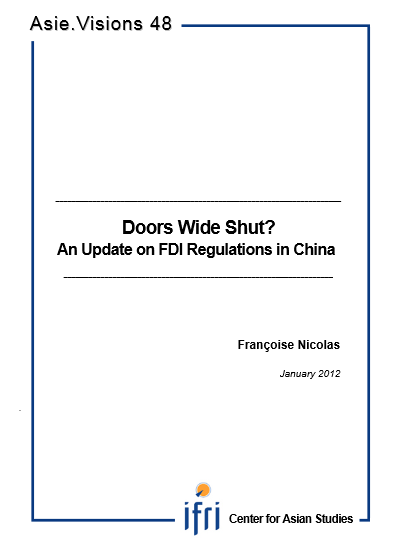Doors Wide Shut? An Update on FDI Regulations in China

The fears of a rise in economic nationalism in China have been fueled by a number of recent moves, such as changes in the law on indigenous innovation or the enactment of a national security review (NSR) regulation for M&As by foreign enterprises. The objective of the current paper is twofold: First is to provide an update on the investment environment in China in order to determine whether or not these provisions reflect a move in the direction of more protectionism, and second is to suggest ways for European countries to level the playing field for their firms wishing to invest in China.
The general message is that no clear-cut trend can be identified. While it cannot be said that the regulatory environment is increasingly rigid, there has not lately been any clear loosening of restrictiveness either.
The recently promulgated changes to the catalogue on foreign investment guidance point to further opening, in particular with fewer restricted categories. However, this positive change is counterbalanced by the persistence of ownership restrictions in particular. Similarly, although the Chinese government has backtracked on its decision to connect indigenous innovation policy and government procurement, the Chinese public procurement market is still heavily restricted for foreign investors. Lastly, the implementation of the merger review under the anti-monopoly law suggests that foreign firms are to some extent being discriminated against even if the recently enacted NSR procedure should not bring major changes to the existing regulatory setting.
More generally, with an important level of discretion left in the hands of Chinese authorities at all levels of responsibility, the business environment remains complex for foreign investors. A major problem in the Chinese case relates to the lack of transparency and of stability in the regulatory environment. The vagueness of some provisions (economic security is a case in point) and the lack of precision in the responsibilities assumed by various levels of government (be they central or provincial, as in the case of the indigenous innovation catalogues) generate an opaque and uncertain business environment. Retroactive application of some regulations is also not uncommon, further increasing the lack of predictability in the regulatory environment.
The challenge for China's partners is to find the best way, beyond regulatory reforms, to level the playing field for their firms operating in China. This paper calls for opening negotiations on a bilateral investment treaty between China and the EU. The treaty needs to be ambitious and comprehensive, covering both pre and post-establishment issues (market access as well as investment protection in particular). One major advantage of a BIT negotiation is that it would be based on a global approach to FDI-related issues, thus allowing trade-offs between various objectives.

Available in:
Regions and themes
ISBN / ISSN
Share
Download the full analysis
This page contains only a summary of our work. If you would like to have access to all the information from our research on the subject, you can download the full version in PDF format.
Doors Wide Shut? An Update on FDI Regulations in China
Related centers and programs
Discover our other research centers and programsFind out more
Discover all our analysesJapan’s Takaichi Landslide: A New Face of Power
Prime Minister Sanae Takaichi has turned her exceptional popularity into a historic political victory. The snap elections of February 8 delivered an overwhelming majority for the Liberal Democratic Party (LDP), driven by strong support from young voters, drawn to her iconoclastic and dynamic image, and from conservative voters reassured by her vision of national assertiveness. This popularity lays the foundation for an ambitious strategy on both the domestic and international fronts.
The U.S. Policy Toward Taiwan Beyond Donald Trump: Mapping the American Stakeholders of U.S.-Taiwan Relations
Donald Trump’s return to the White House reintroduced acute uncertainty into the security commitment of the United States (U.S.) to Taiwan. Unlike President Joe Biden, who repeatedly stated the determination to defend Taiwan, President Trump refrains from commenting on the hypothetical U.S. response in the context of a cross-Strait crisis.

China’s Strategy Toward Pacific Island countries: Countering Taiwan and Western Influence
Over the past decade, China has deployed a diplomatic strategy toward the Pacific Island Countries (PICs). This strategy pursues two main objectives: countering Taiwan's diplomatic influence in the region and countering the influence of liberal democracies in what Beijing refers to as the "Global South."

Opening up the G7 to South Korea to Address Contemporary Global Challenges
The G7’s global influence has diminished as powers like China reshape international governance through initiatives such as BRICS and the Shanghai Cooperation Organisation (SCO). With the G7 now representing just 10 per cent of the world’s population and 28 per cent of global GDP, its relevance is increasingly questioned.










